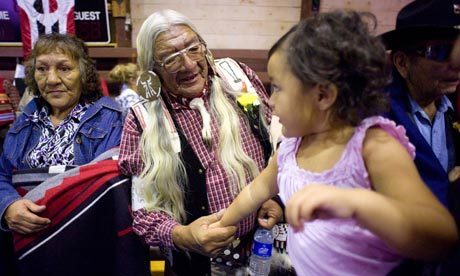
New Laws Having an Unfortunate Impact on Turnout Expectations so Native Americans Fight Voter ID
Democracy, elections and voting at Democracy Chronicles
Voter ID laws have impacted so many different parts of the country that it is hard to keep pace with the variety of groups that have risen up in protest. Native American voters are one such group. It is a sad day when anyone is prevented from voting but with their unique relationship to the US government, Native Americans voting rights deserve some extra attention. The Native American news organization Indian Country has the best information on the subject:
“Indian country is focused on turning out the largest Native vote in history this year – and this report helps us focus our protection and education efforts. Voter ID laws and photo ID laws are a major concern and we are working to make sure Native voters have the information they need to make their voice heard,” NCAI President Jefferson Keel said in a conference call from the organization’s 69th Annual Convention being held in Sacramento, California.
The new report, “Voter ID laws & the Native Vote: States of Concern,” says that state voter ID requirements create three problems. First, it strips American Indians of their rights when states refuse to accept tribal IDs. Second, it costs money, travel and time for American Indians to get a state ID. And, these laws risk disenfranchising voters by rejecting provisional ballots. Three states – Alaska, Florida and Minnesota – either have rules or proposed measures that do not allow the use of tribal IDs for voting.
Also, from a Washington Post article:
Two of the states — Alaska and Florida — do not list tribal ID cards as acceptable forms of identification at the polls. Problems with other new voter ID laws include requirements that voters provide their home addresses, since some tribal communities have no street addresses, and the “barriers of cost, logistics and distance to obtaining required IDs,” the study says.
NCAI President Jefferson Keel said there are races around the country that could hinge on the Native vote, and he wants to ensure no one is disenfranchised by the new laws. He discussed the report at the group’s annual convention being held in Sacramento, Calif.
Leave a Reply